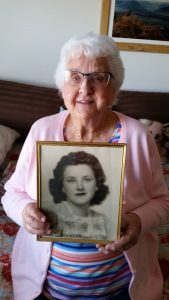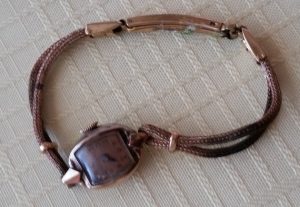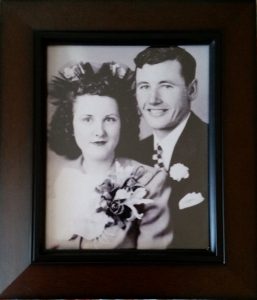Tina Rongstad Falk: Coffee, Cookies and Conversation
Tina Rongstad was the 10th of ten children born in Pinewood, Minnesota to Norwegian immigrants. All her siblings were first generation Norwegian-Americans. Her mother joked that she had so many children she started to number them; for example – Nina (#9) and Tina (#10). “I was born in a log cabin on the farm. We moved into a frame house soon after. I walked 2 miles each way to a one-room grade school. There were about 20 children and one teacher. In those days, there were Indians riding around on ponies – picking strawberries and whatnot.”
“Everyone was poor – no plumbing or modern conveniences, no indoor bathroom, but we got along fine. We had an old telephone that hung on the line.” She attended High School in Bemidji, staying with 2 older sisters there.
“My sister Hannah got married and moved to Kansas City, Kansas. She asked me: ‘Would you like to come down here to work? They’re opening a bomber plant.’ So, in 1941 I moved to Kansas City to become a riveter at the North American Aviation Company. I had to ride the train (from Minnesota) to Kansas City, Missouri. My sister met me and soon we started working.”
“We rode the bus and street car to work. I started out making .75 cents an hour but by the time I left I was making $1.25 an hour. We worked 10 hour days, 7 days a week. There were both night and day shifts. Security was tight. The work was very secret. To prevent sabotage or theft, they searched our pockets and lunch buckets morning and night, turning them inside out. There were no windows in the plant. They were worried that the enemy could fly over and bomb us. It was very urgent.”
“I worked on the B25 bomber. I drilled holes into metal using a rivet gun – to put two pieces together. My parts were on a table. I worked on the same parts all the time. Parts moved along in an assembly line fashion. When you finished riveting a section, it was dropped down on a conveyer belt and moved to the next crew. I wore goggles and a head scarf for protection. Rivet guns were on pulleys hung above our heads. My first training was one on one with another worker. I got more training after working a couple of weeks. It was mostly about safety. ‘You should do this, you shouldn’t do that’.”
 “With my first paycheck, I bought a watch that I still have. I wasn’t much for socializing but there was a time that the girls asked me to go to a dance party – all Czechoslovakians. All they danced was the polka. I thought, ‘that’s not too bad…..I’ve been doing the polka since I was four’.”
“With my first paycheck, I bought a watch that I still have. I wasn’t much for socializing but there was a time that the girls asked me to go to a dance party – all Czechoslovakians. All they danced was the polka. I thought, ‘that’s not too bad…..I’ve been doing the polka since I was four’.”
The only difficulties Tina encountered were due to rationing. “They rationed everything: tires, sugar, coffee. I don’t know why they rationed coffee. Perhaps because it was imported. I worked for 1.5 years until my mother got ill. As the youngest, I had to go home to take care of her. She recovered and lived another 12 years.!”
 “After that I moved to Bemidji and became a cashier in a grocery store. This good-looking man would come in with his mother. One day around November 1944, he asked me if I wanted to go to lunch. He was a farmer so had military deferment. We were married six months later, in June 1945. I moved to the farm in Nebish, Minnesota to live with him and his parents.
“After that I moved to Bemidji and became a cashier in a grocery store. This good-looking man would come in with his mother. One day around November 1944, he asked me if I wanted to go to lunch. He was a farmer so had military deferment. We were married six months later, in June 1945. I moved to the farm in Nebish, Minnesota to live with him and his parents.
“I don’t remember the end of the war. (May 8, 1945) I had a brother in the infantry stationed at Okinawa in the Pacific. He survived the war, returning when he was 22 yrs. old. Two years later, on the 4th of July, he and another boy drowned while swimming. He was only 24 years old.”
Tina and her husband, John built their house and barn and outbuildings on a small piece of land that grew to 360 acres over time. They had two girls who were baptized and went to school in this small town. “You learn a little bit of everything on the farm. We raised sheep, bottle lambs (lambs that needed to be bottle fed 3 times a day for about 3 weeks if the ewe didn’t have enough milk), 80 herd of dairy cattle, (sold milk to Land O’Lakes), grew flowers and vegetables, & canned.”
To accomplish all the farm work, they needed to hire men to help. Tina was always “cooking for the men”. Years later, a 94 year old widow, Tina lives in her own apartment in Bemidji. She says, “I wouldn’t trade any part of my life. Even now I have a good life. People here are friendly. My children are exceptional and very good to me.” And several of the former hired men still visit with her to enjoy her coffee, cookies and conversation.
